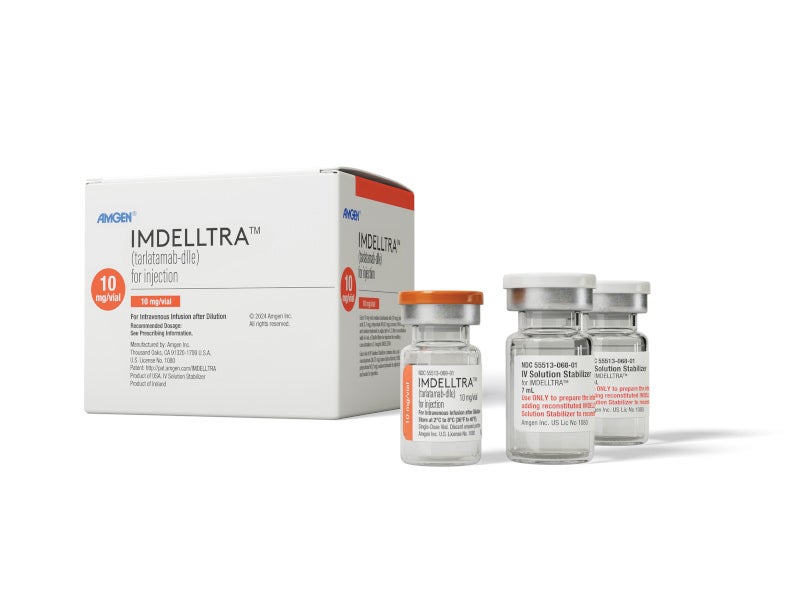IMDELLTRA™ (tarlatamab) is a first-in-class immunotherapy indicated for the treatment of extensive-stage small cell lung cancer (ES-SCLC) in adult patients who have experienced disease progression on or after platinum-based chemotherapy.
Developed by Amgen, a biotechnology company based in the US, it is the first and only delta-like ligand 3 (DLL3)-targeting the bispecific T-cell engager (BiTE®) molecule designed to activate the patient’s own T cells to target and attack DLL3-expressing tumour cells.
The US Food and Drug Administration (FDA) granted accelerated approval to IMDELLTRA™ in May 2024, following the promising response rate and duration of response (DoR) observed in the Phase II DeLLphi-301 clinical trial.
IMDELLTRA™ is available for intravenous administration in 1mg and 10mg strength doses, supplied as a lyophilised powder in a single-dose vial for reconstitution and further dilution.
Extensive-stage small cell lung cancer causes and symptoms
The small cell lung cancer (SCLC) is a rare but aggressive form of lung cancer, with extensive-stage disease signifying a more advanced spread. Typically linked to tobacco use, SCLC can metastasise to various parts of the body, including lymph nodes and organs such as the brain and liver.
The disease is classified into two main types, small cell carcinoma and combined small cell carcinoma, which together represent 2% to 5% of all lung cancers.
Risk factors for SCLC extend beyond smoking to include second-hand smoke exposure, previous radiation therapy for other cancers, radon gas exposure, occupational hazards, a family history of lung cancer and HIV infection.
Symptoms of SCLC are often not apparent until the disease has progressed, but can include chest pain, persistent coughing (sometimes with blood), shortness of breath, facial swelling, fatigue, hoarseness, loss of appetite, swollen neck veins, weight loss and wheezing.
IMDELLTRA’s mechanism of action
The BiTE molecule tarlatamab is engineered to bind to DLL3, expressed on the surface of tumour cells, and CD3, expressed on the surface of T-cells, simultaneously. The dual binding activates T-cells to release inflammatory cytokines and induces lysis of DLL3-expressing cells, exhibiting significant anti-tumour activity.
BiTE technology
Amgen’s BiTE technology is an innovative immuno-oncology platform designed to harness a patient’s T cells to target and destroy cancer cells by recognising specific tumour antigens. The approach has the potential to treat various tumour types and aims to provide off-the-shelf solutions, making advanced T-cell treatments accessible to healthcare providers for timely patient care.
IMDELLTRA is the company’s second FDA-approved BiTE molecule following BLINCYTO® (blinatumomab), a bispecific CD19-directed CD3 T-cell engager indicated for B-cell precursor acute lymphoblastic leukaemia.
Amgen is currently exploring more than a dozen BiTE molecules for their application across a wide spectrum of haematologic malignancies and solid tumours.
Clinical trials on IMDELLTRA
The Phase II DeLLphi-301 clinical trial assessed the efficacy of the drug in patients with relapsed or refractory (r/r) ES-SCLC after two or more previous treatment lines.
The open-label, multi-centre, multi-cohort clinical trial involved 99 patients who received IMDELLTRA intravenously, starting with an initial dose of 1mg on Cycle 1, Day 1, followed by 10mg on Days 8 and 15, and then every two weeks until either disease progression or unacceptable toxicity occurred.
Patients with symptomatic brain metastases, interstitial lung disease, non-infectious pneumonitis, or active immunodeficiency were excluded from the trial.
IMDELLTRA demonstrated an impressive 40% objective response rate, a median DoR of 9.7 months, and a median overall survival of 14.3 months in the pivotal study.
The most common adverse reactions reported during the clinical trial were cytokine release syndrome (CRS), fatigue, fever, dysgeusia (altered taste), reduced appetite, musculoskeletal pain, constipation, anaemia and nausea.
Additional clinical trials on IMDELLTRA
Amgen is currently investigating tarlatamab in several clinical trials within its robust tarlatamab development programme, both as a monotherapy and in combination with other treatments in earlier stages of SCLC.
DeLLphi-302 is a Phase 1b combination study assessing tarlatamab alongside an anti-PD-1 therapy for second-line or later treatment of SCLC.
DeLLphi-303, a Phase Ib clinical trial, is evaluating the safety and efficacy of tarlatamab in combination as a first-line treatment for ES-SCLC.
DeLLphi-304, a Phase III trial, is evaluating the safety and effectiveness of tarlatamab in treating patients whose SCLC has recurred after first-line treatment. DeLLphi-305, a Phase III trial, is assessing tarlatamab in combination with durvalumab versus clinical trial alone in ES-SCLC patients following platinum, etoposide and durvalumab, while another Phase III trial, DeLLphi-306, is evaluating tarlatamab following concurrent chemoradiotherapy in limited-stage SCLC.
The DeLLpro clinical trials are investigating the efficacy and safety of tarlatamab in neuroendocrine prostate cancer.





